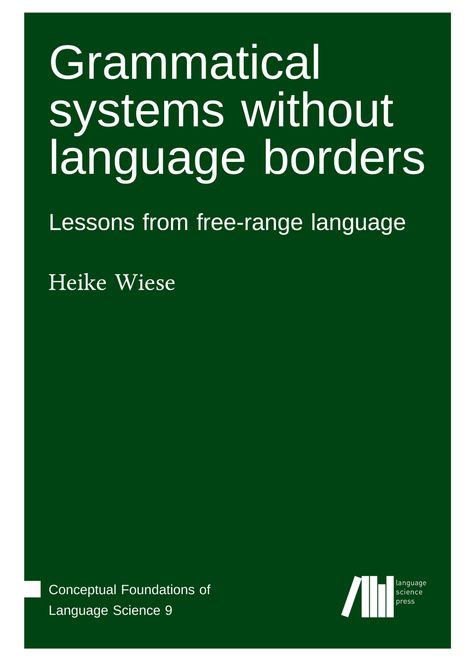Heike Wiese: Grammatical systems without language borders, Gebunden
Grammatical systems without language borders
(soweit verfügbar beim Lieferanten)
- Verlag:
- Language Science Press, 12/2023
- Einband:
- Gebunden, HC runder Rücken kaschiert
- Sprache:
- Englisch
- ISBN-13:
- 9783985540877
- Artikelnummer:
- 11709531
- Umfang:
- 108 Seiten
- Nummer der Auflage:
- 23001
- Ausgabe:
- 1. Auflage
- Gewicht:
- 398 g
- Maße:
- 246 x 175 mm
- Stärke:
- 13 mm
- Erscheinungstermin:
- 11.12.2023
- Hinweis
-
Achtung: Artikel ist nicht in deutscher Sprache!
Klappentext
Current research in grammatical analysis and sociolinguistics points to two core characteristics of language that seem incommensurable at first sight: (1) research on linguistic structure indicates internal organisation and coherence, and the workings and interactions of distinct grammatical systems, but (2) sociolinguistic research suggests that language borders and bound ¿languages¿ are counterfactual social constructs that cannot capture the diversity and fluidity of actual language use. This seems to constitute something like a ¿quantum-linguistic¿ paradox: language systems aren¿t real (they are just ideological constructions), but at the same time, they are a reflection of actual structure. This book shows how this paradox can be resolved through an architecture that allows for grammatical systems without presupposing language borders: this architecture puts communicative situations, rather than languages, at the core of linguistic systematicity, while named languages are captured as optional sociolinguistic indices. The approach builds on insights from ¿free-range¿ language, a metaphor for language in settings that are less confined by monoglossic ideologies. The author looks at four different kinds of settings: urban markets, heritage language settings, multiethnic adolescent peer-groups, and digital social media. Central lessons to be learned from such free-range language settings are: (1) communicative situations support linguistic differentiation and can thus be the basis for fluid registers; (2) grammatical systematicity is grounded in communicative situations and does not require bound languages and linguistic borders; (3) named ¿languages¿ can emerge as social indices signalling belonging, but this is an optional, not a necessary development.
Biografie
Heike Wiese ist Professorin für Deutsche Sprache der Gegenwart an der Universität Potsdam.Anmerkungen:
Bitte beachten Sie, dass auch wir der Preisbindung unterliegen und kurzfristige Preiserhöhungen oder -senkungen an Sie weitergeben müssen.




